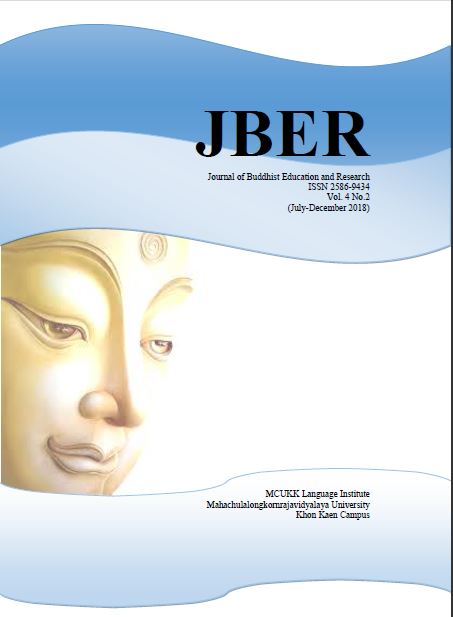AN ANALYTICAL STUDY OF FRIEND ASSOCIATION IN SINGKALAKA SUTA
Keywords:
Association with friends, Singala SuttaAbstract
This research has two objectives 1) to study the Friend-Association in Buddhism, 2) to analyze the Friend-Association in the Sigala sutta which a way or a pattern to choose Friend-Association in accordance with Buddhist principles. The research result found that friend-association in Buddhism, it is the principle of good living and it is a good relationship between the individuals in society according to the duties of each part. The importance of friend-association is important for our lives. The good friend helps the friendly who has a great way to help to make facilitate and the burden easily, make life prosper and otherwise they are helpful not to be disturbed but make friend happy and famous.
Good friend has good principle for practice that promotes friends by the principle for the practice of friend association should be based on Bases of social solidarity) are: Dana (giving), Piyavaca (amicable speech), Atthacariya (helpful action) and Samanattata (participation) because it helps friends to love each other. Not association with bad men it does not praise to be induced in the wrong way. The association with wise man, it praises to be induced in the field of morality. The use of yonisomanasikara (reasoned attention), it helps in screening for a friend who should be association with conscious and intellectual.
The association with friends appear in the Sigala sutta: Buddha said to Sigala in association with friends that friends who should be association with true friends: The helper can be identified by four things, the enduring friend can be identified by four things, the mentor can be identified by four things and the compassionate friend can be identified by four things. The friends who should not be association with are: friends who hold the benefit of only oneself, who just speak good, the one who like to flatter and one who induces a friend in a degenerative way. The association with friends can be analyzed into three parts: morality—knows how to association with true and bad friends, for the benefits are beneficial—if association with a good friend is a role model in the living, maintain in good, development in wholesome, live with confidence and benefit for the society. For society as a result, the society is free Apāyamukha (causes of ruin) such as worry from drug abuse and so on, good society with rule, happiness in society, without encroachment on each other, make people in society have the role and duty to treat the right as good member of society.
References
I. Primary Sources
Mahachulangkornrajavidyalaya. Pāli: Tipitakas: MahachulaTepitakaEdition.
(Bangkok: Mahachulangkornrajavidyalaya Press, 2539/1996.)
II. Secondary Sources
(1) Books
Pin MuthuKant. The House’s floor in Floor. Bangkok: Publishing House,
1975
Phradhamathirajmahamuni (ChodokYanasithiPali 9), 38 Mankhon Sutta.
Bangkok: Mahachulangkornrajavidyalaya Press, 1986
Phradhamapidok(P.A. Payutto), Buddhadhamma(Revised andexpanded). 11th
printing Bangkok: Mahachulangkornrajavidyalaya Press, 2003
________. Research for the Future of Thailand, 2nd printing Bangkok:
Tanthai Public Company Limited Press, 1998
(2) Thesis
PhramahathongthounSatidhampanno (SeourKheav) “Friend Association in
Buddhism”: Degree of Master of Arts, (Master’s Degree
Programme Graduate School.
MahachulalongkornrajavidyalayaUniversityBangkok, Thailand. 2004.





